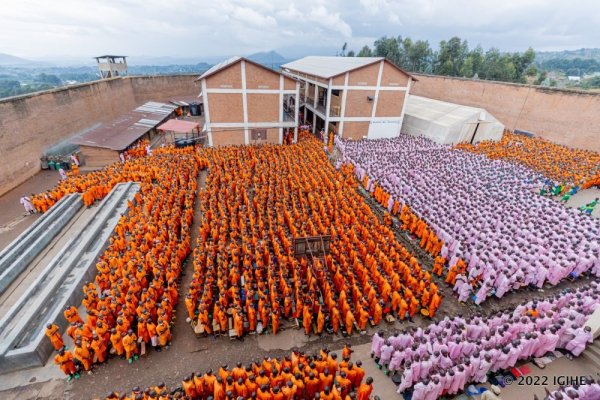Rwanda’s Human Rights commission reports progress but notes persistent Overcrowding in Prisons
The Rwanda Human Rights Commission revealed that despite a reduction in overcrowding in Rwandan prisons, it remains a pressing issue, with the occupancy rate reaching 121.8% in 2023/2024, down from 140.7% in the previous year—indicating a 19% decrease.
An inspection of 13 prisons, including the Nyagatare juvenile facility, found that while nutrition and care standards were satisfactory, overcrowding persists in many areas.
In December 2023, during a nationwide prison inspection, there were 89,550 detainees, including 70,260 held for common crimes and 19,290 detained for genocide-related offenses. The total capacity of Rwanda’s prison system is 66,691, placing the occupancy rate at 134.3%. However, the Rwanda Correctional Service (RCS) indicates this has recently dropped to 121.8%.
Providence Umurungi, Chair of the Human Rights Commission, presented the 2023/2024 report and the 2024/2025 action plan to the Parliament on October 30, 2024, noting that while overcrowding has decreased compared to last year, it remains a significant challenge.
“There is still an issue of overcrowding, even though some measures have addressed this,” she said. “Last year, overcrowding was at 140.7%, and by December 2023, it had reached 134.3%. Thanks to discussions and new strategies, including plea bargaining and temporary releases, the RCS data from early this month shows the rate has continued to decline, now standing at 121.8%.”
In summary, this represents a 19% reduction year-over-year.
“This is encouraging progress, but 121% is still high,” Umurungi added.
The Commission found that prisons with the highest overcrowding compared to their capacity included Rwamagana (159.2%), Rusizi (158.6%), Nyarugenge (158%), Huye (143.5%), Muhanga (142.8%), Bugesera (132.8%), Gicumbi (131.6%), Rubavu (128.2%), Nyanza (120.8%), and Nyagatare (116.8%).
Umurungi noted that some prisons still operate in outdated and small facilities, making it difficult to effectively address overcrowding.
“Many of these prisons are in old buildings, although some have been refurbished, which has helped reduce numbers to an extent. However, the overall detainee count has risen, reaching 89,000 last year. Overcrowding remains a critical issue.”
Data indicates that in the previous year, 2022/2023, the prison population was 86,274.
The Commission found that 79 individuals were being held in prison on expired 30-day provisional detention orders from judges.
Additionally, 101 detainees reported being held despite completing their sentences. This group included 43 detainees in Nyarugenge Prison, 50 in Rwamagana, and 8 in Rubavu.
Eight of these detainees, held for common crimes, were released following the Commission’s intervention. The remaining 93 were being held for genocide-related offenses, with nine of their cases processed, while 81 others were still under review by the Ministry of National Unity and Civic Engagement (MINUBUMWE).

